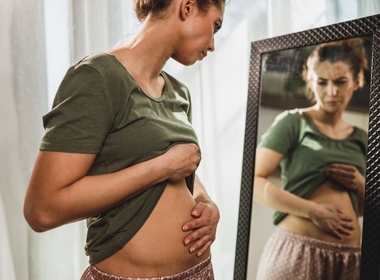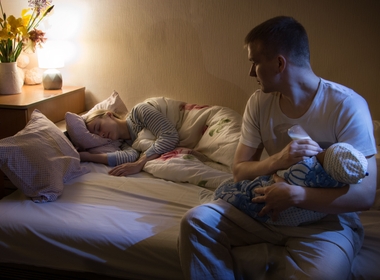Jump to: Conditions | Signs and symptoms | Causes and risk factors | Treatment and support | Partners, family and friends
You may have heard the terms "perinatal mental health" and "maternal mental health" used interchangeably. Both refer to mental health during pregnancy and up to two years after giving birth.
The word "peri" comes from Latin and means "around," while "natal" means "birth".
Click or press the symbol on the top right to see all videos in our Mental Health Midwife series.
If you’re feeling overwhelmed, here is some key information you should know:
If you have a perinatal mental health condition, remember that it’s not your fault.
*We know that perinatal mental health difficulties can affect any birthing and non-birthing parent. However, there is currently a lack of specific prevalence data and research on the specific experiences of trans and non-binary parents.
Most people are aware of postnatal depression, or PND, but depression can also occur during pregnancy. Other perinatal mental illnesses include anxiety, obsessive-compulsive disorder (OCD), post-traumatic stress disorder (PTSD), and eating disorders.
These illnesses can range from mild to severe, and require specialist treatment as soon as possible. The most serious perinatal mental health problem is considered to be pregnancy and postpartum psychosis, which should be treated as a medical emergency if suspected.
Anyone can experience a perinatal mental health problem, although there are some factors which increase someone's risk of becoming unwell, including:

Explore the link between physical and mental health during and after pregnancy, and how conditions like hyperemesis gravidarum, pelvic pain, and sleep deprivation can affect your mental wellbeing.

Discover how fertility challenges and assisted conception can impact perinatal mental health. Explore emotional wellbeing before, during, and after pregnancy.

Mental health and wellbeing tips for women and parents who are pregnant or have recently given birth
The good news is maternal mental health problems are treatable. With the right care and support, it's possible to recover and enjoy being a parent.

Guidance if you are worried that you or a loved one has a maternal mental health problem

Discover treatment and support options for perinatal mental illness, including therapy, medication, peer support, and specialist care.

From urgent care and specialist perinatal mental healthcare, to peer support and charity helplines, there's something for everyone
Learn how to support a new or expectant parent if you're concerned about their mental health.

Find out what to do if you are worried that someone you know is struggling with their mental health during or after pregnancy.

Both you or your partner might be worried about trying for another baby if you were unwell last time. This is completely understandable, so here are some things for you to consider.
The Maternal Mental Health Alliance sends heartfelt thanks to the women and clinicians who generously gave their time to review and offer feedback on our information.
A special thank you to Tessa van der Vord, Mental Health Midwife and MMHA ambassador, for taking part in our perinatal mental health film series.
The videos were recorded at 10 Union Street, which is home to the Royal College of Obstetricians and Gynaecologists and a collection of non-profit organisations, including the Maternal Mental Health Alliance, dedicated to improving maternity safety and women's healthcare.